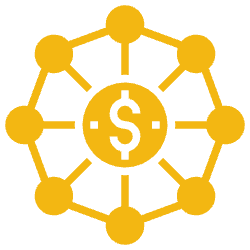Discover the benefits of decentralized exchanges (DEXs) and why they’re revolutionizing the world of cryptocurrency trading. Learn how DEXs offer security, privacy, and control.
Introduction
In the wild west of cryptocurrency, decentralized exchanges (DEXs) have emerged as a game-changer. These platforms, which allow peer-to-peer trading without a central authority, have become the darlings of the crypto world. But what makes them so special? Let’s dive into the fascinating world of DEXs and uncover why they’re taking the trading world by storm.
The Basics of Decentralized Exchanges
What Exactly is a DEX?
A decentralized exchange (DEX) is a platform that facilitates the trading of cryptocurrencies directly between users. Unlike traditional exchanges, DEXs don’t rely on a central authority to manage funds or transactions. Instead, they leverage blockchain technology and smart contracts to enable direct peer-to-peer trading.
- No Middlemen: By eliminating intermediaries, DEXs reduce the risk of hacking and fraud.
- Enhanced Privacy: Users retain control over their funds and personal information.
- Global Accessibility: Anyone with an internet connection can access and use a DEX.
How Do DEXs Work?
DEXs operate on blockchain technology, using smart contracts to automate and secure transactions. These smart contracts are self-executing contracts with the terms of the agreement directly written into code. When a trade is initiated, the smart contract ensures that both parties fulfill their obligations, making the process trustless and secure.
Key Benefits of Using Decentralized Exchanges
1. Greater Security
One of the most significant advantages of DEXs is the enhanced security they offer. Since users retain control over their funds, there’s no need to trust a third party with your assets. This reduces the risk of hacks and theft, which are common issues with centralized exchanges.
- No Central Point of Failure: Without a central authority, DEXs are less vulnerable to large-scale attacks.
- User-Controlled Funds: Users keep their private keys, ensuring complete control over their assets.
2. Enhanced Privacy
Privacy is a cornerstone of decentralized exchanges. Unlike centralized exchanges, which often require extensive personal information and KYC (Know Your Customer) processes, DEXs allow users to trade anonymously.
- No KYC Requirements: Trade without revealing your identity.
- Private Transactions: Keep your trading activities confidential.
3. True Ownership and Control
When you use a DEX, you are the master of your domain. With centralized exchanges, your funds are held in custodial wallets, meaning the exchange has control over your assets. In contrast, DEXs empower users with true ownership.
- Self-Custody: You control your private keys and funds.
- Freedom from Third Parties: No need to rely on an exchange’s security protocols.
4. Lower Fees
Who doesn’t love saving money? DEXs typically have lower fees compared to their centralized counterparts. Without the need for intermediaries and with the automation provided by smart contracts, the costs are kept to a minimum.
- Reduced Transaction Costs: Fewer intermediaries mean lower fees.
- No Withdrawal Fees: Move your assets without incurring extra charges.
5. Access to a Wider Range of Assets
Centralized exchanges often list only a curated selection of cryptocurrencies. DEXs, however, provide access to a broader range of assets, including many that are not available on traditional exchanges.
- New and Emerging Tokens: Discover and trade lesser-known cryptocurrencies.
- Greater Market Diversity: More trading pairs and opportunities.
The Downsides to Consider
1. User Experience
While DEXs offer numerous benefits, they can be a bit daunting for newcomers. The interfaces are often less user-friendly compared to centralized exchanges, and the lack of customer support can be a hurdle.
- Complex Interfaces: Not always intuitive for beginners.
- Self-Support: You’re on your own if issues arise.
2. Limited Liquidity
Liquidity can be an issue on DEXs, especially for less popular tokens. This means you might not always find a buyer or seller for your desired trade, which can lead to slippage and less favorable prices.
- Slippage Risk: Prices can change between order placement and execution.
- Market Depth: Fewer orders can lead to higher volatility.
3. Network Dependence
Since DEXs operate on blockchain networks, their performance is tied to the underlying network. High transaction fees and network congestion can impact trading efficiency.
- Gas Fees: High network fees can make transactions expensive.
- Slow Transactions: Network congestion can delay order execution.
Popular Decentralized Exchanges
Uniswap
Uniswap is one of the most well-known DEXs, operating on the Ethereum blockchain. It uses an automated market maker (AMM) system to facilitate trading and provides liquidity through user-contributed pools.
SushiSwap
Born from a fork of Uniswap, SushiSwap offers similar functionality with additional features like staking and yield farming. It has grown into a comprehensive DeFi platform.
PancakeSwap
Built on Binance Smart Chain (BSC), PancakeSwap offers lower fees and faster transactions compared to its Ethereum-based counterparts. It’s a popular choice for trading BEP-20 tokens.
1inch
1inch is a DEX aggregator that finds the best prices across multiple DEXs. By splitting orders across different exchanges, it minimizes slippage and maximizes returns.
FAQs
What is the difference between a DEX and a centralized exchange (CEX)?
A DEX allows for peer-to-peer trading without intermediaries, while a CEX relies on a central authority to manage transactions and funds. DEXs offer more privacy and control but can be less user-friendly.
Are decentralized exchanges safe?
Yes, DEXs are generally safer in terms of hacking risk because users retain control of their funds. However, they require users to be diligent about securing their private keys and wallets.
How do I get started with a DEX?
To start trading on a DEX, you’ll need a compatible cryptocurrency wallet. Connect your wallet to the DEX, select your trading pair, and execute your trade. Make sure you understand the platform and any associated fees before trading.
Can I use a DEX without revealing my identity?
Yes, most DEXs do not require KYC processes, allowing you to trade anonymously.
Conclusion
Decentralized exchanges (DEXs) are revolutionizing the way we trade cryptocurrencies. With benefits like enhanced security, privacy, and true ownership, they offer a compelling alternative to traditional exchanges. While they come with challenges such as user experience and liquidity, the advantages often outweigh the downsides for many users. As the world of cryptocurrency continues to evolve, DEXs are likely to play an increasingly important role. Ready to explore the benefits of decentralized exchanges (DEXs)? Dive in and experience the future of trading!

